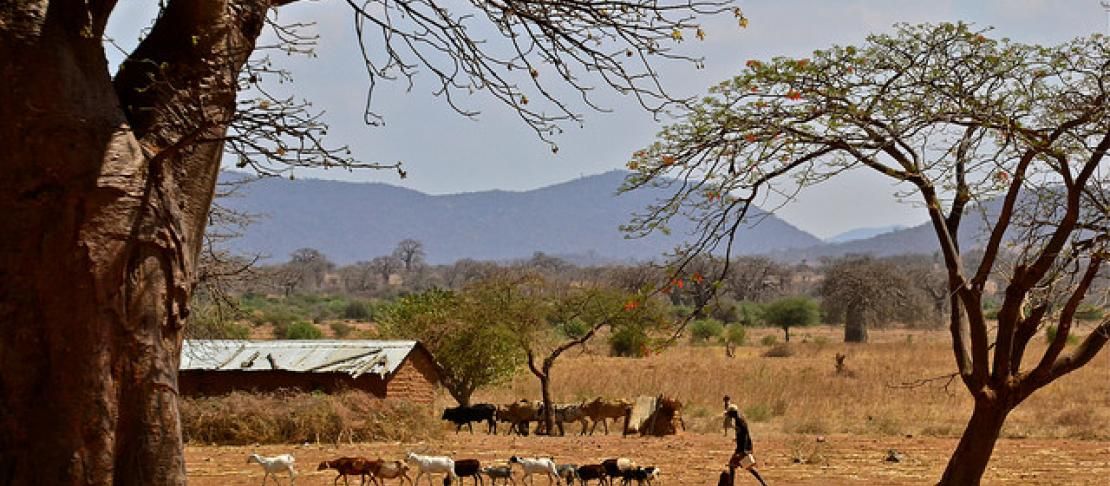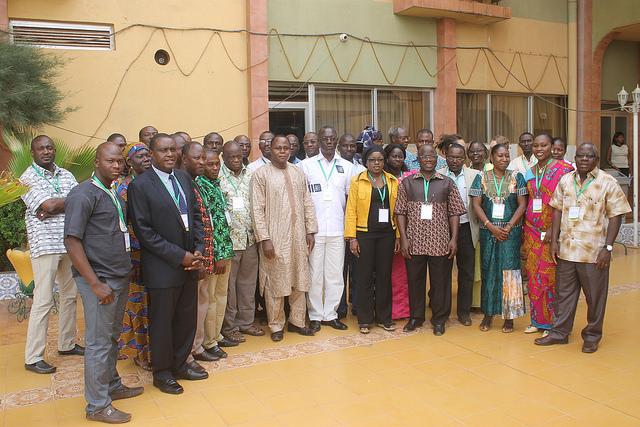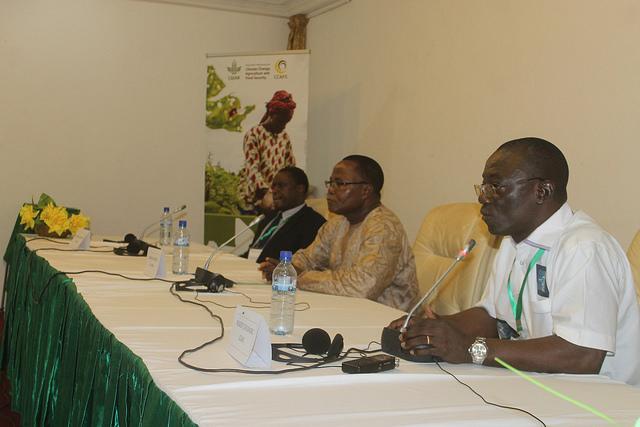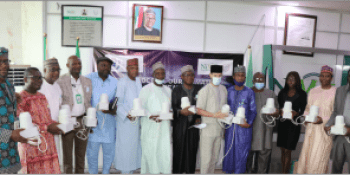Project launched to build more resilient agroforestry pastoral systems in West Africa

"BRAS-PAR", a new large-scale project has been launched to help cope with climate change in West Africa. Its main objective is in the name: Building Resilient Agro-forestry-pastoral Systems through Participatory Action Research.
Rural development in West African countries has for a long time focused on a sector approach, that is, on specific production modes and areas (e.g. crop production, livestock, forestry, aquaculture, etc.). However, over the years, it has become necessary to integrate these factors to ensure sustained productivity, taking into account various elements of risk. Furthermore, in West African communities, farmers prefer integrated production systems which help them minimise production failure risks under harsh environmental conditions.

group photo of bras par project launch
photo: sekou toure (ccafs w.a)
It is within this context that the World Agroforestry Centre (ICRAF) and its partners submitted a project called "Building Resilient Agro-forestry-pastoral Systems through Participatory Action Research (BRAS-PAR) to cope with climate change in West Africa in response to the call for projects from Flagship 1 of the CGIAR Research Programme on Climate Change, Agriculture and Food Security (CCAFS).
The project has been approved for funding and will be implemented in Tibtenga (Burkina Faso), Doggoh and Bompari (Ghana), Kampa Zarma (Niger), and Ngouye and DagaBirale (Senegal). It aims to develop social and technological innovations based on climate-smart agriculture (CSA) approaches. To that end, it will seek to integrate crop-livestock-tree systems through better understanding of farmers’ demand and perception and taking into account gender and social differentiation issues.
In concrete terms, BRAS-PAR addresses the following questions:
- How can crop-livestock-agroforestry production systems better be integrated into agro-ecosystems to help smallholder farmers be more resilient in West Africa within a variable and changing climate context?
- How can the different climate-smart technologies for water management and integrated crop-livestock-tree systems be combined to improve the adaptation capacity of small farmers, their food and nutrition security, and their incomes?
- What are the sustainability prospects for crop-livestock-tree transformative options in households and communities?
- What are the conditions and socio-institutional determinants for adoption of incremental water management and integrated climate-smart crop-livestock-tree technologies?
How does the project intend to achieve its objectives?
By focusing on participatory planning...
- By equipping existing multi-stakeholder partnership platforms to promote the development of climate-smart agriculture
- By defining clear indicators for resilience and adaptation capacity based on Pramova et al. (2013) coupled with the soil degradation assessment and monitoring tool
- By identifying major climatic risks, constraints, opportunities and resources
- By drawing a vulnerability map of the various groups
- By defining and developing appropriate partnerships (technical support units, local village committees, etc.) to achieve the common vision
- By identifying technology options for tests and farm demonstrations
... by testing agricultural innovations on the field with communities
- Based on climate information, particularly seasonal forecasts
- a combination of improved agronomic practices and soil/water conservation techniques (minimum tillage, crop rotation, organic fertilization, microdosing)
- agro-forestry practices (land rehabilitation and vegetation, assisted natural regeneration of trees, improvement of fruits, leafy vegetables, wood, etc.)
- improvement of food production and nutrition systems for livestock (fodder production, management of crop residues, low-cost rations for livestock production)
- development of agro-business skills
- participatory assessment.
... by building capacity and developing partnerships for upscaling climate-smart village models
This involves:
- training researchers in approaches, methods and tools required for action research;
- establishing technical support units on sites to ensure implementation, monitoring and communication of Participatory Action Research (PAR) results;
- mobilising national platforms (scientists/policymakers dialogue) to link national priority needs to experiences at local level and specific favourable conditions.
A promising partnership
For its implementation, the BRAS-PAR project has a wide range of partners. Intervening on specific themes or topics, these partners will be instrumental in the project’s success.

a promising partnership
Photo:sekou toure (ccafs w.a)
In addition to ICRAF which will coordinate the project and land health issues, model trees-crops interactions in agroforestry systems, and analyze the value chain, there are also:
- producers and local communities, the primary project partners, who will allow for faster adoption of climate-smart agriculture technologies;
- the International Livestock Research Institute (ILRI) responsible for animal production issues and development of value chains, the innovation systems approach, and modelling of production systems;
- the International Union for Conservation of Nature (IUCN) responsible for natural resource management, local governance, innovative planning tools, inclusive monitoring and evaluation, and social learning;
- the International Water Management Institute (IWMI) which handles issues relating to water and upscaling of proven technologies through the use of media and video;
- AGHRYMET Regional Centre responsible for climate information;
- national meteorological services of the countries concerned;
- national agricultural research institutes (INERA-Burkina Faso, SARI-Ghana, INRAN-Niger and ISRA-Senegal);
- NGOs for upscaling and strategic partnerships;
the private sector (microfinance, mobile phone, etc.).
What are the expected research results and impacts of the project?
National agricultural research institutions (INERA in Burkina Faso, SARI in Ghana, INRAN in Niger, and ISRA in Senegal) will implement and institutionalise participatory action research principles through integration of non-traditional partners into the development of technologies. The intervention of these partners (NGOs, input suppliers and agricultural input traders, micro-finance institutions)will create an appropriate environment for upscaling climate-smart agriculture technologies.
National development partners (national extension services, development projects and farmer organisations) in Burkina Faso, Ghana, Niger and Senegal will disseminate and ensure better access to information on the best CSA portfolios.
Thus, the adaptation capacity of 1,000,000 small farmers in Burkina Faso, Ghana, Niger and Senegal (with 50% women and 500 000 per country) will be strengthened through strategic planning of their farming activities, based on knowledge of climate-smart agriculture technologies and practices.
The private sector, including NGOs (FNGN, Larwaal, ProNet Nord, and CARE International), micro-credit institutions, agro-traders, and rural radios in Burkina Faso, Ghana, Niger and Senegalwill scale up the dissemination of relevant CSA portfolios throughnew incentive programmes. Micro-financing will bear the initial cost on the long term (soil rehabilitation and vegetation technologies and practices) and expensive operations such water collection ponds.
Jules Bayala is the Principal Project Investigator and Senior Scientist at ICRAF.
Robert Zougmoré is Director of the West Africa CCAFS Programme.
Sékou Touré is Communication Officer of the West Africa CCAFS Programme.
Mathieu Ouédraogo is PAR Researcher at the West Africa CCAFS Programme.



